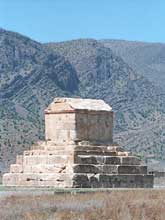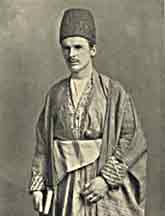|
|
 |
|
Tomb of
Cyrus the Great in the valley of Passargadae, near Shiraz in Iran.
|
|
Cylinder of Cyrus the Great
 |
|
The first declaration
of human rights by Cyrus the Great, the founder of Persian Empire,
532 BCE. |
|
Is The Vandidad a Zarathushtrian Scripture?
Shahzadi,Mobed Rostam
A review of evolution of
Zarathushtrian priesthood, religious practices, and the adaptation of
temporal laws as religious laws in a remarkable presentation by late
Mobedan-e-Mobed of Iran.
Metaphor in the Gathas, Part 1:
The Natural Metaphors
McIntyre, Dina G.
Zarathushtra uses pastoral metaphors to convey his
thoughts, and his solution for the defeat of evil. Dina's raises
interesting questions while making thoughtful observations.
From Wilderness to Light
Shroff, Maharukh
A strong case for the changes put forward toward the practice of Zarathushtrian religion in
India,
Mobedan-e-Mobed Rostam Dinyar Shahzadi
An
embodiment of enlightenment, courage and dedication
Mehrfar, Dr. Khosro E.
A
dedicated man who became the well
celebrated Mobedan-e-Mobed on Iran of the 1990s; whose acts of courage
earned him the respect of his nation.
Zarathushtra, Mazdayasna,
and Governance
Jahanian, Dr. Daryoush
The form of
government consistent with Zarathushtra's vision for
humanity is the topic of discussion of this insightful book.
In Yazd with Edward Browne, Spring 1888 AD
In his visit to Yazd, Browne
observed and provided a detailed account of Zarathushti community and their customs;
samples of Dari dialect and more are preserved in this remarkable
document.
Passargadae,
the birthplace of Persian Empire
Varza, Jamshid
The Old
Testament, Herodotus writings, and archeological findings all describe
Cyrus the Great as a figure of immense importance in ancient history.
Cyrus founded the Perisan Empire, the first ancient world empire
consisting of many nations, cultures and religions based on his own
Zoroastrian belief in equality of all men.
|
 |
|
Late Mobedan-e-Moden
Rostam Shahzadi delivering the keynote speech on Zarathushra's
birthday, March 26, 1999 |
 |
|
Edward G. Browne in
traditional Persian dress, 1888 AD |
|